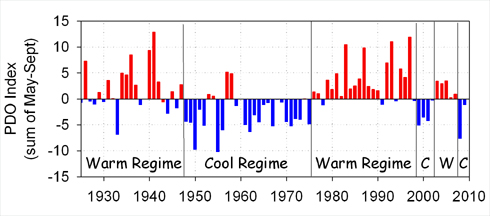No Worries About Salmon This Year
by Ken Schlichte
Note: Ken Schlichte is an expert forest soil scientist in western Washington
“Worries rise as ocean oxygen levels sink — CLIMATE CHANGE?: NW waters among those facing food chain woes” is the title of an article alleging low offshore oxygen levels that appeared in the March 8 issue of The Olympian [here]. The article included the following statements:
Lower levels of oxygen in oceans, particularly off the Northwest coast, could be another sign of fundamental changes linked to global climate change, scientists say. They warn that the oceans’ complex undersea ecosystems and fragile food chains could be disrupted.
-and-
If the Earth continues to warm, the expectation is we will have lower and lower oxygen levels,” said Francis Chan, a marine researcher at Oregon State.
-and-
Scientists have long known of a natural low-oxygen zone perched in the deeper water off the Northwest’s continental shelf. During the summer, northerly winds aided by Earth’s rotation drive surface water away from the shore. This action sucks oxygen-poor water to the surface in a process called upwelling. Though the water that’s pulled up from the depths is poor in oxygen, it’s rich in nutrients, which fertilize phytoplankton. These microscopic organisms form the bottom of one of the richest ocean food chains in the world.
-and-
Scientists are unsure how low oxygen levels will affect the ocean ecosystem. Bottom-dwelling species could be at the greatest risk because they move slowly and might not be able to escape the lower oxygen levels. Most fish can swim out of danger. Some species, however, such as chinook salmon, may have to start swimming at shallower depths than they’re used to. Whether the low oxygen zones will change salmon migration routes is unclear.
This March 8, 2010 article suggests that climate change warming is associated with the recent coastal Northwest low-oxygen zones and that chinook salmon may be negatively impacted.
The NOAA Northwest Fisheries Science Center report [here], however, indicates that 2008 was the most negative (coolest) Pacific Decadal Oscillation year since 1956 and that these negative (cool) conditions continued on into 2009.

Figure 2. Time series of shifts in sign of the Pacific Decadal Oscillation (PDO), 1925 to 2009. Values are averaged over the months of May through September. Red bars indicate positive (warm) years; blue bars negative (cool) years. Note that 2008 was the most negative since 1956.
Forecasts for returns in 2010 are for large numbers of fish, and again, these anticipated returns are associated with the strongly negative PDO (and cold ocean) in effect for juvenile Chinook and coho that entered the ocean in spring 2008.
NOAA’s Northwest Fisheries Science Center has also reported that:
During 2008, the trend of cold ocean conditions, which started to become established in 2007, has continued. The fact that cold ocean conditions have now become well established bodes well for marine fish (especially salmon) and bird species, since many of them will almost certainly have a good recruitment year.
Tacoma News Tribune reported on the December 17, 2009 [here] that the biggest run of spring chinook salmon since before the completion of the Bonneville Dam in 1938 is forecast to enter the Columbia River in 2010.
In 2005 the Seattle Times reported [here] that many scientists suspected that climate change may have been involved in the warmer waters along the Northwest coast, even though the article also indicated that these warmer waters, the seabird deaths and other marine food source shortages were apparently caused by a lack of northerly winds and the absence of upwelling of cold, nutrient-rich water to the surface.
Northerly winds and the upwelling of the deep, cold, low-oxygen waters off the Northwest coast are known to result in the creation of low-oxygen “dead zones”. But an absence of northerly winds with no upwelling of the deep, cold, nutrient-rich waters off the Northwest coast is known to reduce food sources for sea birds, salmon and marine mammals.
Shifts in the Pacific Decadal Oscillation are primarily responsible for the wide range of Northwest offshore ocean temperatures since 1925, and 2008 was the most negative (coolest) year since 1956, in effect refuting the comments by the scientists in the two recent newspaper articles above about warming and climate change.
